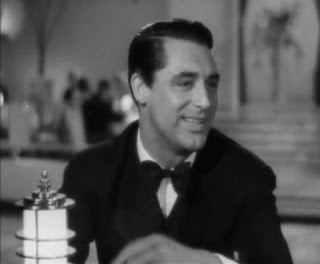The Awful Truth started as a 1923 play, became a silent picture in 1925, and had been filmed again (with sound) in 1929. Through some studio and property consolidation, it ended up at Columbia and a script produced and offered to director Tay Garnett who turned it down, saying that the script "was about as funny as a seven year itch in an iron lung." Leo McCarey, a veteran of Laurel and Hardy movies and who'd directed the Marx Brothers' Duck Soup, looked over the script, declared "I've seen worse," and took the job because he needed the work.
McCarey worked with his collaborators on Make Way for Tomorrow, Viña Delmar and her husband Eugene, to break the play down to component parts and threw everything else away. Irene Dunne was hired, despite her lack of comedic experience—her previous film had comedy and got her an Oscar nomination—and McCarey thought such a straight-laced actress would be hilarious as a comic foil. Cary Grant was hired soon after, and Ralph Bellamy, a contract player for Columbia, soon after that, but Bellamy wasn't told anything about his character.
The actors arrived on-set to find no script. McCarey just wanted to talk and trade stories. The only footage shot was of Dunne haltingly playing piano while Bellamy (who couldn't sing) belted out "Home on the Range." McCarey filmed it, and the two were horrified to see it end up in the picture. Grant, who'd just come from the more rigid, business-like atmosphere of Paramount Studios, was horrified that there was no set script and that he was being encouraged to improvise with the camera rolling. The first five days of the intended filming, Grant did everything he could—including suggesting trading parts with Bellamy—to get out of it.
But, something about it "clicked." Grant began to get comfortable with, and even began to favor, the McCarey ad-libbing style, suggesting bits of business, and using his own earlier frustrations during the film to inspire his character's moments of confusion. Most of the film was improvised the day of filming. McCarey and his actors were generous with each other, making fun of themselves and leaving any pretensions behind. Long takes were filmed that were only interrupted when the actors cracked each other up. Dunne came to be sorry to see each day's filming end, and the film came in under schedule and under budget. McCarey won the Oscar for Best Director for this film—he groused that he should have won it for Make Way for Tomorrow—and Bellamy and Dunne were nominated for their performances, as was, ironically, Delmar for the script, little of which made it to the screen.
What is lovely about this scene is that, although the Warriners are making fun of the "rube" from Oklahoma, they're also so dumb they don't recognize their own false pride in creating the subterfuges over misunderstandings and creating more damage over what is, basically, nothing. Except honest truth. The "awful truth" of the title is that the Warriners love each other...they just don't want to admit it. Fools.
The Set-Up: High Society New Jersey-ites Lucy and Jerry Warriner (Irene Dunne, Cary Grant) suspect each other of having affairs, which—naturally—starts to put a strain on their (up to now) happy marriage. Divorce proceedings begin and the two begin trying to one-up each other with trumped-up flings and attempts to sabotage them. Here, Lucy has brought her new "beau" (Ralph Bellamy) to Jerry's club to meet his new girl, a performer there.
Action.
LUCY WARRINER: She seems like a nice girl...
JERRY WARRINER: Ah, yes, indeed.
JERRY: But enough about Dixie Belle for the moment, let's talk about yourselves...
JERRY: Ah, so you're going to live in Oklahoma, eh, Lucy?
JERRY: How I envy you.
JERRY: Ever since I was a small boy that name has been...
JERRY: ...filled with magic for me:
JERRY: Oklahoma!
DANIEL LEESON: (unaware of the sarcasm) We're going to live right in Oklahoma City.
JERRY: Not Oklahoma City itself?!
Leeson nods.
JERRY: Lucy, you lucky girl.
JERRY: No more running around the nightspots, no more prowling around in New York shops.
JERRY: I shall think of you every time a new show opens and say to myself, "She's well out of it."
DANIEL: New York's all right for a visit, but...
DANIEL and JERRY: (together) ...I wouldn't want to live here.
LUCY: I know I'll enjoy Oklahoma City.
JERRY: But of course!
JERRY: And if it should get dull, you can always go over to Tulsa for the weekend.
JERRY: I think a big change like that does one good, don't you?
DANIEL: Well, that's right.
DANIEL: Say, I know this isn't quite the place, but Lucy tells me you two own a coal mine.
JERRY: What about it?
LUCY: Oh, yes. Uh, Mr. Leeson thought that maybe he'd like to buy your interest.
LUCY: That is, if the price is right. I, I was telling Mr. Leeson...
LUCY: I mean Daniel,
Daniel chuckles.
LUCY: ...about how badly we were doing and he thought that maybe he could do better with it.
JERRY: I suppose you told him there wasn't any coal in it, too.
DANIEL: Well, if you're interested, you might bring me around the data tomorrow.
DANIEL: I'm very lucky...
DANIEL: You know what they call me back home?
LUCY: (shaking her head discouragingly) Daniel...
JERRY: I can guess....
The Awful Truth
Words by Viña Delmar (and Sidney Buchman) and quite a few others
Pictures by Joseph Walker and Leo McCarey
The Awful Truth is available on DVD and Blu-Ray from Sony Pictures Home Entertainment and The Criterion Collection.





















































